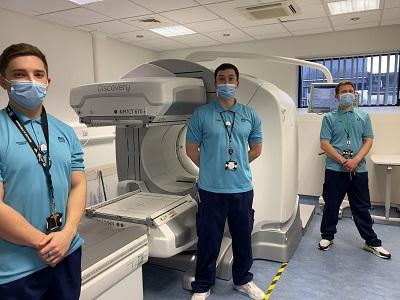
A new training programme which is supporting the recruitment of Nuclear Medicine Technologists in Tayside is proving very successful.
To support NHS Tayside’s future workforce requirements of trained Nuclear Medicine Technologists, the team in the Nuclear Medicine Department at Ninewells Hospital developed a new in-house training programme.
Trainee scientific graduates were recruited and undertook the Clinical Technologist Training Scheme (CTTS) which is run by the Institute of Physics and Engineering in Medicine (IPEM). This formal training programme was also supplemented by on-the-job training and work experience with various staff groups working in Nuclear Medicine, Radiopharmacy and PET/CT scanning.
The CTTS has a strong reputation offering a robust, externally validated education and training framework for clinical technologists. Successful completion of the CTTS sees graduates awarded IPEM’s Diploma in Clinical Technology and opens a route to joining the Register of Clinical Technologists (RCT).
Elaine Davidson, Chief Technologist, Nuclear Medicine Department at Ninewells Hospital said, “The first participants on the new training programme have completed all their training and are now much valued members of the team. There was a large response to the initial job advert for the three vacancies proving that this alternative route to becoming a Nuclear Medicine Technologist was popular.
“The trainees have been great right from the start and have done amazingly well throughout their two years of training. They have enjoyed the course so much that two of them have gone out to schools to talk to students about their experiences and their role within the Nuclear Medicine Department at NHS Tayside.”
“This training programme has proved to be very successful for scientific graduates with degrees in physics, chemistry, biochemistry to become technologists and I am delighted to say that we have taken on a further two trainees who are already half-way through their course.”
Former trainee Struan Robertson, who is now working as a clinical technologist at Ninewells Hospital, spoke about the training programme, “l am incredibly proud to have passed the technologist training scheme. The past two years have been a rewarding but challenging experience. The scheme involved a large portfolio, viva and practical assessment.
“I have been very well supported throughout my training with opportunities to develop skills in a range of areas including Nuclear Medicine, PET-CT scanning and Radiopharmacy.
“I would encourage anyone with an interest in healthcare with a scientific background to look at becoming a technologist. I am really looking forward to continually improving my skill set and looking for further opportunities to advance my knowledge.”
The Nuclear Medicine Department is staffed by a multi-disciplinary team of clinicians, radiologists, physicists, technologists, radiographers, support workers and administrative staff. It is a busy department carrying out about 7000 tests a year. A Nuclear Medicine test uses a small amount of radioactivity and by 'scanning' the distribution of radioactivity using a gamma camera this provides information about how your body is working. The most common types of tests that are carried out are lung scans, bone scans and myocardial perfusion scans of the heart. The department also carries out therapies for thyroid cancer.